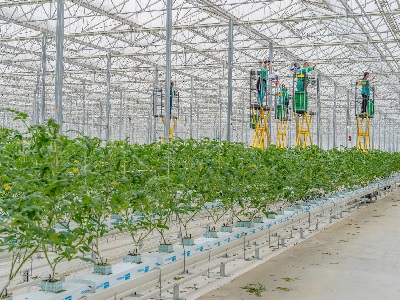ISET students and PI representatives visit Planta greenhouse
- Details

Representatives of ISET and the ISET Policy Institute visited JSC Georgian Greenhouse Corporation (hereinafter, Planta), the largest greenhouse in Georgia, within their remit to introduce second-year MA students to the practical side of their agriculture-related studies at ISET. Planta is one of the Georgian Co-Investment Fund’s projects located in the Gardabani municipality of the Kvemo Kartli region. Work began on Planta in 2014, with the Richel Group – a leading French greenhouse company – selecting Gardabani especially, as it has one of the highest amount of sun isolation in Georgia and also for its near location with Tbilisi.
Currently, the greenhouse covers 12 hectares of land to produce cucumbers and tomatoes. Vegetables from the greenhouse are sold at local markets and it are also exported. The greenhouse is equipped with modern technology, and the total amount invested in the project stands at 25 million USD. They employ around 180 workers, mostly locals.
Warwick University Professor Omer Moav visits ISET
- Details

On Tuesday April 11, ISET hosted Warwick University Professor Omer Moav. Professor Moav delivered a profoundly interesting lecture to the ISET Community about the work that he and his colleagues have worked on together, specifically a revolutionary hypothesis about the emergence of social and political hierarchies in early agrarian societies. Contrary to some of the established theories (e.g. by Karl Marx and Jared Diamond), Moav and his colleagues argue that hierarchies (and state structures) emerged not as a result of increased productivity per se (the traditional Marxian thesis is that the ruling classes emerged whenever and wherever agriculture became sufficiently productive in order generate surpluses). Instead, they argue that social and political hierarchies are causally linked to the cultivation of cereals (e.g. wheat, rice, and maize). Furthermore, storage itself is correlated with hierarchy, and cereals are a good storable staple.










